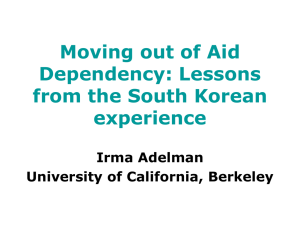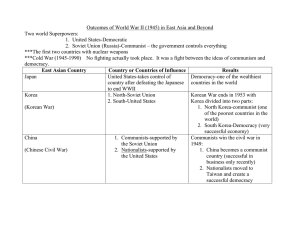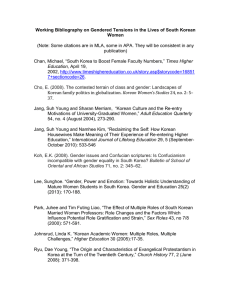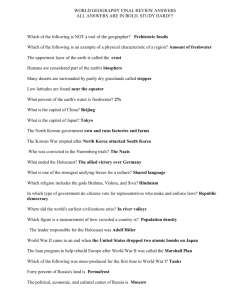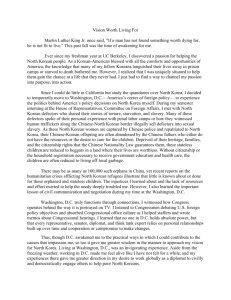An Early 21 Century Appraisal Richard W. Chadwick
advertisement
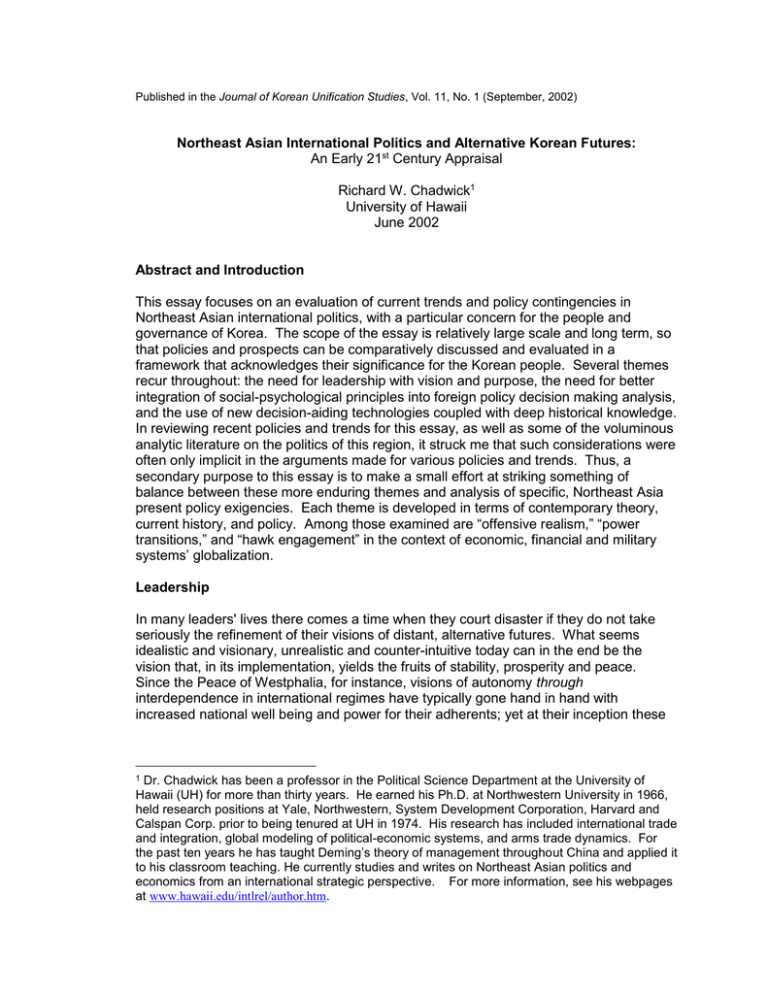
Published in the Journal of Korean Unification Studies, Vol. 11, No. 1 (September, 2002) Northeast Asian International Politics and Alternative Korean Futures: An Early 21st Century Appraisal Richard W. Chadwick1 University of Hawaii June 2002 Abstract and Introduction This essay focuses on an evaluation of current trends and policy contingencies in Northeast Asian international politics, with a particular concern for the people and governance of Korea. The scope of the essay is relatively large scale and long term, so that policies and prospects can be comparatively discussed and evaluated in a framework that acknowledges their significance for the Korean people. Several themes recur throughout: the need for leadership with vision and purpose, the need for better integration of social-psychological principles into foreign policy decision making analysis, and the use of new decision-aiding technologies coupled with deep historical knowledge. In reviewing recent policies and trends for this essay, as well as some of the voluminous analytic literature on the politics of this region, it struck me that such considerations were often only implicit in the arguments made for various policies and trends. Thus, a secondary purpose to this essay is to make a small effort at striking something of balance between these more enduring themes and analysis of specific, Northeast Asia present policy exigencies. Each theme is developed in terms of contemporary theory, current history, and policy. Among those examined are “offensive realism,” “power transitions,” and “hawk engagement” in the context of economic, financial and military systems’ globalization. Leadership In many leaders' lives there comes a time when they court disaster if they do not take seriously the refinement of their visions of distant, alternative futures. What seems idealistic and visionary, unrealistic and counter-intuitive today can in the end be the vision that, in its implementation, yields the fruits of stability, prosperity and peace. Since the Peace of Westphalia, for instance, visions of autonomy through interdependence in international regimes have typically gone hand in hand with increased national well being and power for their adherents; yet at their inception these 1 Dr. Chadwick has been a professor in the Political Science Department at the University of Hawaii (UH) for more than thirty years. He earned his Ph.D. at Northwestern University in 1966, held research positions at Yale, Northwestern, System Development Corporation, Harvard and Calspan Corp. prior to being tenured at UH in 1974. His research has included international trade and integration, global modeling of political-economic systems, and arms trade dynamics. For the past ten years he has taught Deming’s theory of management throughout China and applied it to his classroom teaching. He currently studies and writes on Northeast Asian politics and economics from an international strategic perspective. For more information, see his webpages at www.hawaii.edu/intlrel/author.htm. visions of autonomy through interdependence seemed to be merely a passing fantasy.2 Let us review for a moment some of the key events that have shaped the modern era and which illustrate this point. Consider the European Union today, a living realization of just such an incongruity; in its inception it was considered unrealistic, a romanticism, certainly unrealistic and even delusional. Similarly, just a few short centuries ago the vision of a United States of America arising from thirteen widely different, mutually distrustful and sometimes hostile colonies, seemed just as incongruous. In its inception, the vision of a united India freed from colonial rule, democratic and even prosperous, seemed to be the dream of a madman, sometimes even to Gandhi's closest followers. Similarly, Mao's vision of an independent and communist China seemed to the Soviet regime's leaders both theoretically impossible and politically intractable, at least until the late ‘40s. A generation later, it seemed just as unlikely that Deng Xiaoping would adopt a vision, much less succeed, to change China from an economic recluse, poor and poorly managed but independent, to what promises today to become one of the world's great economic powers. There was a price to pay for this transformation to economic power, namely increased interdependence and accommodation to the world's largest financial and trade regime, a thoroughly capitalist system controlled by China's former colonizers and incarnated in the WTO and a renovated IMF and World Bank system. Yet it was a price that Deng believed in the end would strengthen China, and of course, he proved to be correct. Visions of democratic transformations in Japan, South Korea and West Germany were thought by many to be impossibly unrealistic, given their political histories and cultures. The spontaneous reuniting of Germany, the spontaneous collapse of the USSR and the rise of an emergent Russian democracy were each situated similarly in contemporaneous minds. Each of these transformations were led, guided or supported by leaders with visions of what was desirable and possible, not visions based on projections of likely outcomes given the drift of then current trends.3 2 It is sometimes important to define one's terms. The distinction between autonomy and interdependence is between self-governance and mutual dependency or relevance. Logically, some degree of autonomy is entailed in the characterizing of relations as interdependent. Since the Peace of Westphalia there has been tacit recognition of both autonomy and interdependence as unavoidable if not always acceptable in international affairs. The idea that autonomy is somehow inversely related to interdependence is too often tacitly accepted; in an era of globalization this is in my judgment a dangerous, counterfactual presupposition. 3 Some might suggest that this is a "constructivist" interpretation. Walt characterizes this position as follows: " Whereas realism and liberalism tend to focus on material factors such as power or trade, constructivist approaches emphasize the impact of ideas." (Stephen M. Walt, "International relations: one world, many theories," Foreign Policy, Spring, 1998, and can be found on the web through http://home.pi.be/~lazone/). The essence of my perspective was originally presented as part of an article on integration theory in 1970 and published in 1973, as "Steps toward a Probabilistic Systems Theory of Political Behavior, with Special Reference to Integration Theory," in Hayward R. Alker, Jr., Antoine Stoetzel, and Karl W. Deutsch (Eds.) Mathematical Approaches to International Relations, pp. 67-112; Elsevier Publishing Company, Amsterdam, and presented at the 1970 Congress of the International Political Studies Association, Munich, West Germany. None of these leaders had it easy; mortal enemies plagued each in their lifetimes and sometimes resulted in their assassination. Such comprehensive, even radical change in the thinking of leaders and leadership groups is rare, as are the desperate conditions which when sustained typically increase their likelihood. For instance, dozens of leaders over two generations turned Europe from a centuries long path of colonial expansion and internecine warfare punctuated by unstable periods of power balances and economic ruin, to a union resembling the American colonies' Articles of Confederation period following its Revolutionary War. Similarly, dozens of leaders forged the American colonies from the late 18th to early 19th centuries into a nation bound together in part by mutual fear of common European enemies who sought to tear it apart for two more generations through the American Civil War. Japanese leaders struggled in the aftermath of the devastation of World War II and subsequent depression to create a new vision for their country, sometimes supported by and sometimes despite American hegemony. Now, both Korean governments struggle to forge new societies for themselves, one under the hegemony of the United States, one formerly under Russian hegemony. Each of the two Koreas have seen in the other their hated colonial legacy; each became mutual enemies driven by their fears of being conquered. Each, in a gross irony, came to fear in the other the very colonial domination they had experienced under Japan. Today the Koreas’ two leadership groups still struggle under their memories of colonial rule, past and continuing hostilities, economic depression, and hegemonic influence to find a path to peace and prosperity without experiencing again the utter ruin of past generations. China's traditional relationship with Korea is again gradually reasserting itself, propelled by China’s own rapid economic development, open doors to South Korean trade, the decline of Russian influence in North Korea, and by the mixed blessing of tens of thousands of impoverished and brutalized North Koreans fleeing across the border into the usually welcoming hands of Chinese Koreans despite China's vacillating policies. In this macroeconomic and social upheaval, It would seem that North Korean leaders are tacitly coming to recognize that at least the economic aspects of North Korea's juche idea of self-reliance are inconsistent with modern economic interdependencies and political realities. Specifically, Hong Song-nam would appear to have signaled intentions to follow a path similar to Deng's.4 And while the USA has clearly removed its support for Kim Dae Jung's rapprochement with the North, opting for "hawk engagement,"5 both 4 The People's Korea, "SPA Approves New State Budget Featuring Technical Innovation and Modernization of Economy," (report on the SPA meeting of March 27, 2002). Web: http://www.korea-np.co.jp/pk/178th_issue/2002033004.htm. This was reported on by Sang-hun Choe, “N. Korea Seeks to End Fiscal Isolation,” The Washington Post, March 28, 2002. Web: http://www.washtimes.com/world/20020328-64372000.htm. Hong's statements were interpreted as departing from the juche idea as applied to economics. 5 For an extended discussion of "hawk engagement," see Victor Cha, "Korea's Place in the Axis," Foreign Affairs, 81:3 (May-June, 2002). Earlier essays of his on this subject can be found: "Hawk Engagement: Bush Policy Toward North Korea," presented at the CSIS-KINU conference, Washington, D.C., June 21-22, 2001; "Hawk Engagement: Avoiding the Brink with North Korea," PacNet Newsletter, #05 February 1, 2002; and "Benign Neglect or Hawk Engagement?" Op-ed., JoongAng Ilbo, February 6, 2002. The essential idea is that the USA can view engagement policies not as a sign of weakness but as suggested in the last citation, to "build a coalition for Koreas’ leaderships appear to see the need for constructive engagement as a first step towards reunification on mutually acceptable terms, although that seems as far off as the union of Germany did until the tearing down of the Berlin Wall by ordinary citizens on both sides. Thus it is that a persistent lack of common vision among Korean leaderships of what that future union might be based upon, coupled with the mutual, continual probing of China and the USA in what is describe by Mearsheimer as "offensive realism,"6 has created a stalemate, a kind of "local equilibrium" in what would otherwise be an unstable regional power balance. Neither the predominant powers in the region nor the Korean leaderships they influence, have found a path to stable peace and prosperity for the Korean people.7 Assuming for the moment that the above is a reasonably accurate assessment, specifically that the leaders of China, the USA, Russia, Japan, and the two Koreas, do not have sufficiently compatible visions of the future of Korea to sustain a dialog leading to stable peace, the question arises: why is this? While not addressing the litany of visions above which in large measure created our recent history, John Mearsheimer nevertheless offers a compelling theory through which we can understand this failure of vision as a function of the fears of leaders in an anarchic international environment. He contends that the aim of great powers is to "maximize their share of world power" because they "fear each other and compete for power as a result," because "having dominant power is the best means to insure one's own survival."8 Further, he says that it is their lack of consensus to create some form of world government that tragically prevents them from avoiding competition and occasional hostilities. In the regional context of Korea, the disagreement among these governments is at bottom a question of which society should give up hope to project its power not over the Korean people per se but the Korean peninsula as a geographic location for either the further projection of power or to prevent such a use against them. Japan fought China and Russia for control of the Korean peninsula successfully, but refused to curb her ambitions and withdraw when it saw that the USA’s entry into World War II would in all likelihood lead to a devastating outcome.9 China then successfully fought off the European and American mercantilist interests in its homeland (Taiwan, Hong Kong and Macao excepted) as well as the Japanese; but the USA was unwilling to give up its hope for a non-communist China, or at least a foothold on the Asian continent, so the Korean War was fought to an impasse that has lasted until this very day. The above analysis focused primarily on the visions of leaders and leadership groups, viewed from the perspective of offensive realism. At least one or two other observations need to be added for a fuller picture. The Korean War was fought within the framework of collective security, not individual national interests per se. Unlike the two World Wars, punishment," make "threats to punish more credible," especially if backed by "robust defense capabilities." 6 John J. Mearsheimer, The Tragedy of Great Power Politics. W.W. Norton, 2001. 7 For a discussion of four alternative future scenarios for North Korean economic and political conditions, see Marcus Noland, "The Future of North Korea," Korean Journal of Defense Analysis, June, 2002. Web availability: http://www.iie.com/papers/noland0502.pdf. For an earlier and more wide ranging discussion of alternative scenarios especially regarding reunification, see Jonathan D. Pollack and Chung Min Lee, Preparing for Korean Unification: Scenarios and Implications. RAND, 1999. Web availability: http://www.rand.org/publications/MR/MR1040/. 8Mearsheimer, op. cit., pp. xi-xiii, passim. Mearsheimer refers to his form of realist theory as "offensive realism" so I will follow his usage here to refer to his views in subsequent sections. 9 Mearsheimer, op. cit., pp. 221-224 passim. a war between nations was never declared, and to this day, there is no victor. From Woodrow Wilson's time to the present the belief that the means of modern warfare are unacceptably destructive, has changed the face of international relations by introducing myriad transnational and international institutions to provide alternative venues for political struggles among national interests, and opportunities to identify and cope with problems that could otherwise lead to wars of desperation or accident.10 Many such institutions aid both Koreas in dealing with each other's existence; and the North has experienced and continues to experience considerable aid from them. If offensive realism is to make its case in the strongest of terms, it needs to take into account the dilemmas of modern "WMD" power in a transnational corporate and international organizational environment that creates interdependencies that must be managed cooperatively rather than competitively. Social-psychological Theory and Rational Choice Mearsheimer’s claim that Japan’s precipitating America’s entry into World War II was rational in the context of “offensive realism.” Japan's problem was not irrationality per se but the fact that Japan’s choices were “between two repugnant alternatives:” either give up its empire without fighting the USA or risk losing its empire by losing a war with the USA.11 This may well be true. However, others have suggested that rationality is often severely constrained by factors which limit the perception of alternatives, distort priorities, shorten focus, and oversimplify causal connections. Janis, for instance, proposes that leaders tend to substitute consensus seeking for critical thinking when alternatives imply moral compromise.12 Stoessinger suggests more specifically that misperceptions of relative power are rooted in cultural biases, which stereotype and belittle enemies on ethnic, racial and religious grounds.13 The point to such socialpsychological interpretations is not to suggest that offensive realism or realist theory in general is incorrect, but rather that when leadership groups “fear each other and compete for power as a result” as Mearsheimer says, there are specific types of error to which they are chronically prone, and that there are specific prescriptive processes and thinking styles which can reduce the likelihood of those errors of judgment and miscalculation. Janis recommends a regime of critical thinking and analysis that emphasizes group openness, self-reflection, and repeated consideration of alternatives and priorities. Stoessinger emphasizes the need for human compassion and thinking about the needs of others, even your enemies. Heifetz focuses on prescriptions for 10 It was precisely this hope for institutions that would enable clearer and more timely thinking that lay behind Lewis Fry Richardson's appeal for more "sufficiently strenuous intellectual and moral effort" to avoid arms races that would lead to economic destruction and precipitate wars of desperation. See Lewis Fry Richardson, Arms and Insecurity: A Mathematical Study of the Causes of War. Boxwood Press, 1960. It is also important to note that his theory envisioned "fear" in Mearsheimer's sense not as a consequence of the Westphalian system but as a function of a parameter defined as cooperation minus conflict, where cooperation referred to desirable international interactions and interdependencies such as trade, and conflict referred to violent domestic as well and international conflict. Fear increased as conflict came to exceed cooperation; thus fear was not an inevitable function of the anarchic structure of the international system but rather the failure of leaders to develop cooperative policies and institutions, domestically as well as internationally. 11 Mearsheimer, op. cit., p. 224. 12 Irving Janis, Victims of Groupthink: A Psychological Study of Foreign-Policy Decisions and Fiascoes. Houghton-Mifflin, 1973. 13 John Stoessinger, Why Nations Go to War. Bedford/St. Martin’s (8th ed.), 2001. improving leaders’ thought processes and perceptions, for instance separating role from self.14 All of this is important in general to improve the quality of leaders’ decision making. In the present globalized trading and financial system, it has become not just desirable but critical that such improvements take place. The ongoing revolution in and distribution of new technologies has created what Tammen and others believe is a dangerous "power transition" window.15 Technology’s impact on power transitions is believed to be great enough soon to challenge the stability of the international distribution of power. Building on Organski’s power transition theory, they describe a number of scenarios which represent new opportunities and problems for the major powers in Northeast Asia.16 The dangers inherent in such transitions are compounded by increases in the complexity and speed of change in power components. Shorter decision time, more severe threat to values, and increasingly unanticipated events are likely, and together create what Hermann17 characterized as a crisis decision-making environment. If this analysis is correct, then major efforts should be made to improve the quality of decision making in the region. In the short term, "hawk engagement" should be supplemented if not entirely replaced by concerted efforts to increase the venues through which information and concerns can be shared, e.g., academic fora involving all parties to disputes in the region, far more sharing of intelligence, frank diplomatic exchanges, efforts to develop cooperative relations in trade, finance and investment, and so on--all this in an effort to improve the information base on which decisions are made. Longer term, acculturating the next generation of leaders to the realities of globalization, and involving them in international dialogs, is essential. The aim of both short term and long term communication improvements is to reduce the risk of poor decisions that lead to unnecessary and expensive conflicts. Power transitions are known to be dangerous, and are known to irrationally inflame ambitions and fears. Visions of alternative futures become constrained by "worst scenario" fears. For instance, it might be thought that since the Taepo Dong 2 test that North Korea is at least one step further along in being able to threaten the USA, and certainly Japan. But China has not provided critical technology for nuclear warheads, so even though North Korea may have a nuclear device or two, it has nothing useable. How much anxiety should this cause the USA, Japan, or for that matter, China or Russia? It is at this point of assessment that the problems Janis, Stoessinger and others raise become relevant. Credibility, putative intentions, and anticipated duration of policy commitments, are crucial judgments which depend as much on the vision of leaders and their assumptions about what is desirable and possible in their political environment, as on objective factors. Another example comes from the provocative article written recently by Elizabeth Economy: "China is no longer a totalitarian state. It does not boast a revolutionary or 14 Ronald A. Heifetz, Leadership without Easy Answers. Harvard University Press 1994. Ronald L. Tammen, Jacek Kugler (Ed.), Douglas Lemke (Ed.), Carole Alsharabati, and Brian Efird, Power Transitions: Strategies for the 21st Century. Seven Bridges Press 2000. 16 Tammen et al., op. cit., Chapter 7 passim. 17 Charles F. Hermann, “Some Consequences of Crisis which Limit the Viability of Organizations,” Administrative Science Quarterly, 8:1 (June 1963). 15 expansionist ideology, does not operate under a command economy, does not seek to control every aspect of people's lives, and does not pose a threat to U.S. leadership in the world."18 She goes on to emphasize the need for constructive engagement across a wide spectrum of issues, such as the USA's current Taiwan policies: "intervention is divisive, provocative and unnecessary." Again, questions of judgment and assimilation of information would seem to be as important as objective factors.19 Global Dynamics and the Korean Context A great deal of analysis has been devoted to the Northeast Asian problematique20 in the last decade, but not entirely for reasons that are unique to the region. It is commonly understood that new biological, energy, and communication and transportation technologies have contributed to the reshaping of a global system that cannot survive in its present form, and that systemic change has been underway for many decades. Thus an appreciation of Northeast Asian politics requires that the dynamics of global, systemic change be thoroughly integrated into one’s understanding of the region, and a new vision of what is desirable and possible be created that can contribute to the security and prosperity of these nations. Northeast Asian politics partakes of a global system paradox. Thanks to “globalization,” never have so many human beings throughout recorded history, on average, lived so long, been so well educated, had so much religious and political freedom, and been so safe from war and disease.21 Yet paradoxically there is tremendous, destabilizing disparity in humanity’s life conditions; for despite the averages, many people within and across societies suffer grinding poverty and fear for their lives, either because of the lack of basic necessities (food, potable water, shelter) and education, or for fear of violence at the hands of their neighbors or indeed their own governments.22 Further, there is the haunting perception that amidst this cornucopia brought through technological progress, 18 Elizabeth Economy, "Take a New Look at a Changing China," International Herald Tribune, April 30, 2002. 19 While Economy observes the inconsistencies between the facts about China and the present USA policies, she does not account for them. Such disconnects have long been recognized and theorized about. See for instance, Robert Jervis, "Hypotheses on Misperception," World Politics, Vol. 20, No. 3 (April 1968); reprinted in Falk and Kim, THE WAR SYSTEM (1980: Westview Press, Boulder, Col.), pp. 465-490. Stoessinger, op. cit., attributes them to stereotyping and cultural biases, Janis, op. cit., to dysfunctional group dynamics. Most realists give such phenomena little attention, arguing simply that poor judgment (judgments not based on realist premises and accurate power assessments) will lead to failure. 20 The term problematique was popularized in 1972 by its use in Donella Meadows et al., The Limits to Growth (Potomac Associates, 1972), who reported on the first use of global modeling to examine alternative futures for the global economic and environmental systems, and draw implications for political and social change. For a brief history and evaluation of global modeling see my article, "Global Modeling: Origins, Assessment and Alternative Futures," Simulation & Gaming, 31 (2000). 21 For an excellent, affordable and reasonably user friendly global model outlining these trends and permitting a wide variety of scenario analysis, see Barry B. Hughes, International Futures (3rd edition). Westview Press, 1999. Web availability: http://du.edu/~bhughes/ifs.html. 22 Rudolph Rummel has devoted much of his academic career to demonstrating the relationships between regime type and government's killing their own people. In fact, in the 20 th century it was not the world wars and natural disasters that were the primary source of violent death, but rather government killing. See Rummel's website, http://www.hawaii.edu/powerkills/. nuclear, biological and other “WMDs” (weapons of mass destruction) may either be or are likely soon to be in the hands of “rogue states” or even tiny groups of fanatics bent on destroying their imagined enemies. If that were not enough, according to the USA's National Intelligence Council, “…narcotraffickers, and organized criminals will take advantage of the new high-speed information environment…to compound their threat to stability and security around the world” perhaps with EMP (electro-magnetic pulse) “bombs” and cyberwar software.23 Nowhere is this paradox more evident than in the contrast between the two Koreas and their neighbors. While North Korea has been afflicted with almost a decade of floods and famine estimated to have reduced its GDP by half since 1993,24 its neighbors, China and South Korea, have in recent years enjoyed increasing prosperity and often 6-7% growth rates, and occasionally even higher. While one might think that this situation is unique historically, at least two scholars have recently noted some striking similarities between the modern epoch and the conditions facing central Europe circa 1648 AD, out of which period the modern state system emerged. In their recent book, Exorcising the Ghost of Westphalia, Kegley and Raymond present us with a checklist of these similarities. They note that both the 1648 period and the modern era were times of (a) international system change, (b) confusion and uncertainty in a broad spectrum of economic and social as well as political issues, (c) clashes of moral values and visions of global governance vs. national autonomy via sovereign independence, (d) the breaking up and reassembling of nation-states, (e) contested relations between church and state, (f) international refugee crises for persons due to wars and famine, (g) humanitarian intervention, (h) revolution in communications technology (then the printing press), and (i) easy movement of goods and ideas across borders.25 They note that the same choices between anarchy and world order which were on the minds of the treaty signers at Westphalia, were also on the minds of leaders of modern states that faced the necessity for collective security after World War II and today in confronting the facts of globalization of trade, finance, investment, and communication. Kegley and Raymond's judgment is that the Westphalian system of autonomous states failed adequately to assure peace even in 1648 because it discounted morality in favor of a Hobbesian view of global politics; and that peace without justice was simply not a stable condition; and that the same holds true today. What does this analysis imply for Northeast Asia? They propose moving by a series of policy steps from a global culture of mistrust to a culture of reciprocal trust, and from there to trust based on identity: "The most constructivist approach to building reciprocitybased trust is a firm-but-conciliatory strategy that communicates amicable intentions, rewards cooperation, and punishes exploitative behavior.26 23 United States National Intelligence Council, Global Trends 2015: A Dialogue About the Future With Nongovernment Experts. NIC 2000-02, December 2000, GPO stock number 041-01500211-2. Web: http://www.odci.gov/cia/publications/globaltrends2015/index.html. 24 Bureau of Democracy, Human Rights, and Labor, US Dept. of State, “Country Reports on Human Rights Practices: Korea, Democratic People's Republic of.” March 4, 2002. Web: http://www.state.gov/g/drl/rls/hrrpt/2001/eap/8330.htm. 25 Charles W. Kegley, Jr. and Gregory A. Raymond, Exorcising the Ghost of Westphalia: Building World Order in the New Millennium. Prentice-Hall, 2002, pp. 2-3. 26 Ibid. pp. 212-215 passim. So far as I understand it, the Kegley-Raymond strategy of building reciprocal trust is diametrically opposed to the concept of "hawk engagement" in intent, but very similar in practice, at least in the early stages, because in both cases one engages with one's putative enemy in reconciliatory gestures and initiatives. After a time, such a strategy would seem increasingly unrealistic if duplicitous intentions were uncovered, as those who propose "hawk engagement" suspect of North Korea. Yet the very same sort of mistrust characterized most parties to the original agreement creating the ECSC (European Coal and Steel Community); the very idea that the chronically warring European states would form a Union, that Germany would reunite and be part of that Union, that the USSR would disintegrate, form a democracy and join NATO, that a communist-capitalism in China would open relations with a nominally independent but diplomatically isolated Taiwan, and so on, all seemed equally ludicrous just prior to their occurrences. In all cases, social and economic forces not under political control dominated these changes, and created conditions not that would necessarily lead to reciprocal trust, but which created the conditions under which leaders with vision could aim for establishing reciprocal trust through careful dialogs and cumulative successes at cooperation. In short, taking such steps and doing so successfully is what is important. But for such a strategy to last, the participants need to not lose their nerve and to keep their eye on the prize: establishing peace, security, and conditions that create prosperity. The Koreas have an opportunity to realistically assess the trends in the region and to take actions that build reciprocal trust. They cannot expect support from the major powers, but neither need they fear significant opposition, for no major power in the region can opt for strong military or economic sanctions without incurring the risk of unacceptable costs. Their own power and fear of confrontation with their competitors prevents strong action; and the opportunity to "negotiate rather than fight"27 will remain viable given the existing distribution of power. A few years ago (1999), I suggested a similar strategy in which the inducement to cooperation between the North and South Korean governments be specifically economic, namely, "South Korea will aim to promote peace by learning how, and then teaching others how, to produce quality products and services which people want at prices they are willing to pay, so that all may survive, be secure, be respected, and grow spiritually.28 This strategy has worked very well for Japan since World War II, is working well for China and South Korea today. It is likely to work well for Russia, and has worked for some time throughout the European Union and of course, the USA. A much more detail program, in which this was a central component, was outlined a decade ago by Lee, who examined the evolving pattern of reconciliation in Europe that led to integration.29 With its economy mismanaged, many of its people near starvation, and tens of thousands in its labor force fleeing to China for work, the North Korean government has little to look forward to. It has little prospect of renovating an obsolete economic infrastructure without external assistance. This is not a time for duplicity. It is a time for open doors and aid. "Hawk engagement" this may be 27 The phrase is from Morton Kaplan's famous list of strategy rules in a balance of power system. See Morton Kaplan, System and Process in International Politics. Wiley, 1957. Reprinted by Krieger Publishing Company, 1975. 28 Richard W. Chadwick, "Notes on The Cold War Structure in Korea: Can It Be Dissolved?" Prepared for the KINU International Symposium on "Thinking of Dissolving the Cold War Structure in the Korean Peninsula," April 8, 1999, Seoul, Korea. 29 Hun Kyung Lee, North-South Korean Reunification Policies (1988-1991): Options, and Models. Ph.D. dissertation, University of Hawaii, 1992. at first, but if President Kim Dae Jung and his supporters prevail on the domestic Korean political scene, the result may surprise everyone, as usual.
